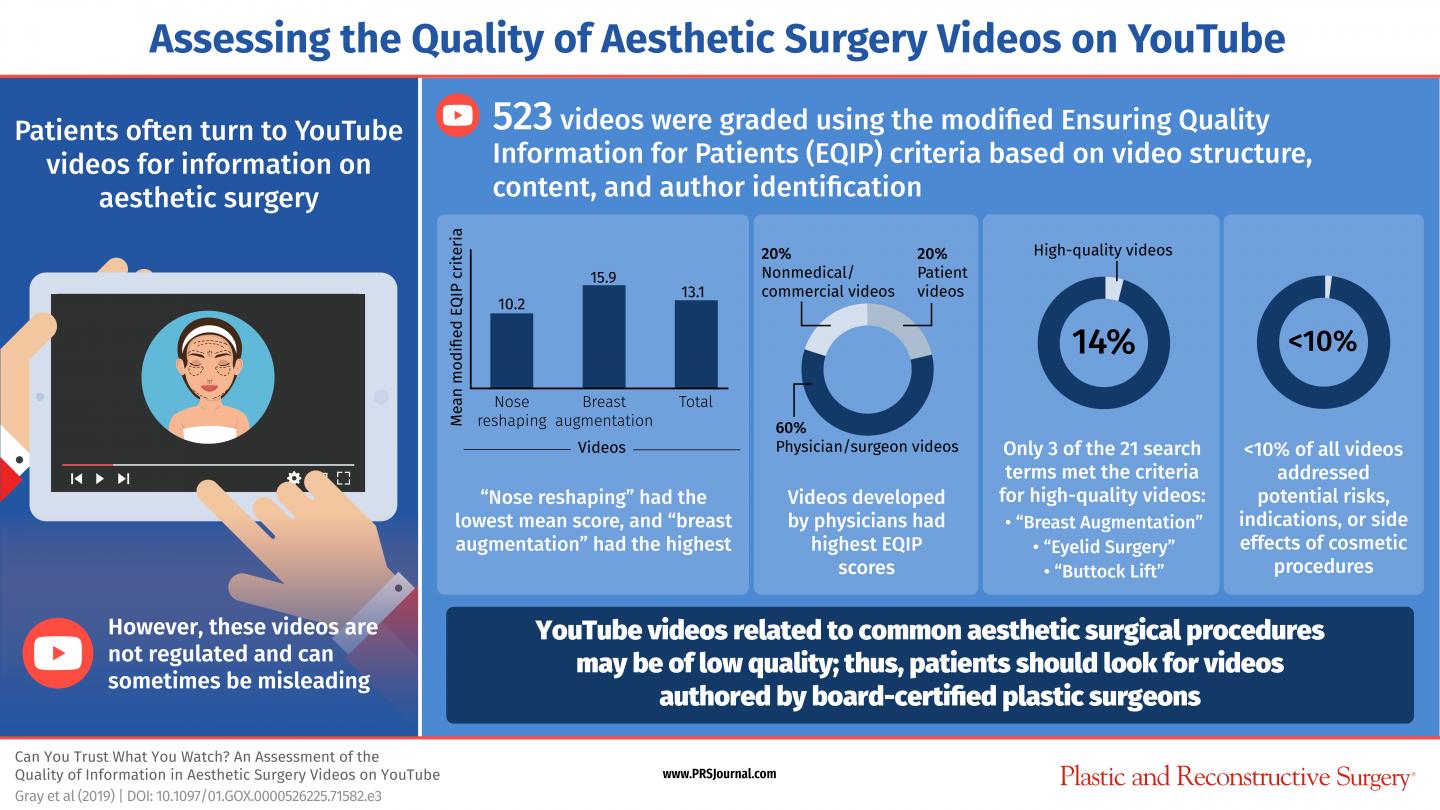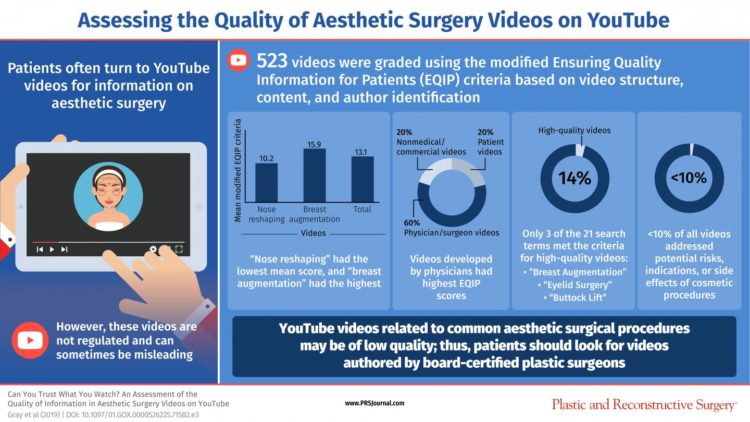
Credit: Plastic and Reconstructive Surgery
January 29, 2020 – In the era of ‘Dr. Google,’ social media is a tremendous influence on patients interested in cosmetic surgery, and with more than two billion users – representing almost one-third of the internet – YouTube has emerged as an essential platform for reaching people interested in plastic surgery.
However, due to a variety of factors, such as confusing terminology, inaccurate information and unreliable sources, YouTube and social media videos in general aren’t necessarily the most reliable source of information, concludes a study in the February issue of Plastic and Reconstructive Surgery®, the official medical journal of the American Society of Plastic Surgeons (ASPS).
The findings come at a time of increasing awareness of the importance of social media in plastic surgery. In a recent ASPS survey, members rated social media as the single greatest impact on people’s desire to get or consider getting plastic surgery.
“Anyone can post videos on YouTube, with no regulation or oversight, potentially leading to misinformation,” said ASPS member Ash Patel, MBChB, of Albany (N.Y.) Medical Center, senior author of a new study on the accuracy of public-facing plastic surgery videos.
“Patients should be aware that the information contained in aesthetic surgery videos could be of low-quality and has the potential to be inaccurate,” Dr. Patel continued. “This study is really about informing the public and encouraging plastic surgeons to play an active role in developing and sharing accurate and more complete videos on cosmetic procedures.”
Dr. Patel and colleagues searched YouTube to identify the top results for common aesthetic and plastic surgery procedures. The search included not only the medical terms for the procedures (such as ‘abdominoplasty’) but also commonly used lay terms (such as ‘tummy tuck’) and discovered less than ten percent of videos addressed the potential risks, indications, or side effects of cosmetic procedures.
The quality of the information provided by each video was assessed using a modified version of the validated Ensuring Quality Information for Patients (EQIP) tool. The EQIP is used by physicians to determine if medical information is understandable, non-biased and properly describes the risks, benefits and alternatives of medical treatment. Of the total 523 videos rated, about 60 percent were developed by physicians or surgeons, 20 percent by patients, and 20 percent by other sources defined as non-medical personnel and commercial entities promoting services. Physician-produced videos had the highest average number of views compared to the other categories.
Most of the video content was low-quality, with an average EQIP score of about 13, out of a possible 26 points. “Overall, only three out of 21 search terms met criteria for high-quality videos,” according to Dr. Patel. “Only the terms ‘breast augmentation,’ ‘eyelid surgery’ and ‘buttock lift’ received high-quality scores–mainly due to the volume of relevant videos produced by so many different plastic surgeons. ‘Breast augmentation’ had the highest average score (about 16), while ‘nose reshaping’ had the lowest score (about 10).
Quality was higher for videos developed by physicians or surgeons: average EQIP score of about 14, compared to 12 for videos developed by patients and 10 for videos from other sources. But even for physician-produced videos, only about half of videos were considered high-quality.
“It involves a little research from the viewer, but they should check if the video is produced by a board-certified plastic surgeon” said Dr. Patel. “A good video will be easy to understand and provide information that includes who are good surgical candidates, as well as the risks, benefits and alternatives of the procedure.”
###
Click here to read “Can You Trust What You Watch? An Assessment of the Quality of Information in Aesthetic Surgery Videos on YouTube.”
DOI: 10.1097/PRS.0000000000006463
# # #
Plastic and Reconstructive Surgery® is published in the Lippincott portfolio by Wolters Kluwer.
About Plastic and Reconstructive Surgery
For more than 70 years, Plastic and Reconstructive Surgery® (http://www.
About ASPS
The American Society of Plastic Surgeons is the largest organization of board-certified plastic surgeons in the world. Representing more than 7,000 physician members, the society is recognized as a leading authority and information source on cosmetic and reconstructive plastic surgery. ASPS comprises more than 94 percent of all board-certified plastic surgeons in the United States. Founded in 1931, the society represents physicians certified by The American Board of Plastic Surgery or The Royal College of Physicians and Surgeons of Canada.
About Wolters Kluwer
Wolters Kluwer (WKL) is a global leader in professional information, software solutions, and services for the clinicians, nurses, accountants, lawyers, and tax, finance, audit, risk, compliance, and regulatory sectors. We help our customers make critical decisions every day by providing expert solutions that combine deep domain knowledge with advanced technology and services.
Wolters Kluwer reported 2018 annual revenues of €4.3 billion. The group serves customers in over 180 countries, maintains operations in over 40 countries, and employs approximately 18,600 people worldwide. The company is headquartered in Alphen aan den Rijn, the Netherlands.
Wolters Kluwer provides trusted clinical technology and evidence-based solutions that engage clinicians, patients, researchers and students with advanced clinical decision support, learning and research and clinical intelligence. For more information about our solutions, visit http://healthclarity.
For more information, visit http://www.
Media Contact
Connie Hughes
[email protected]
646-674-6348





